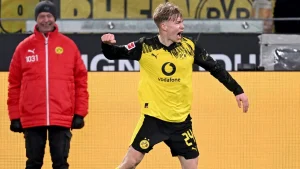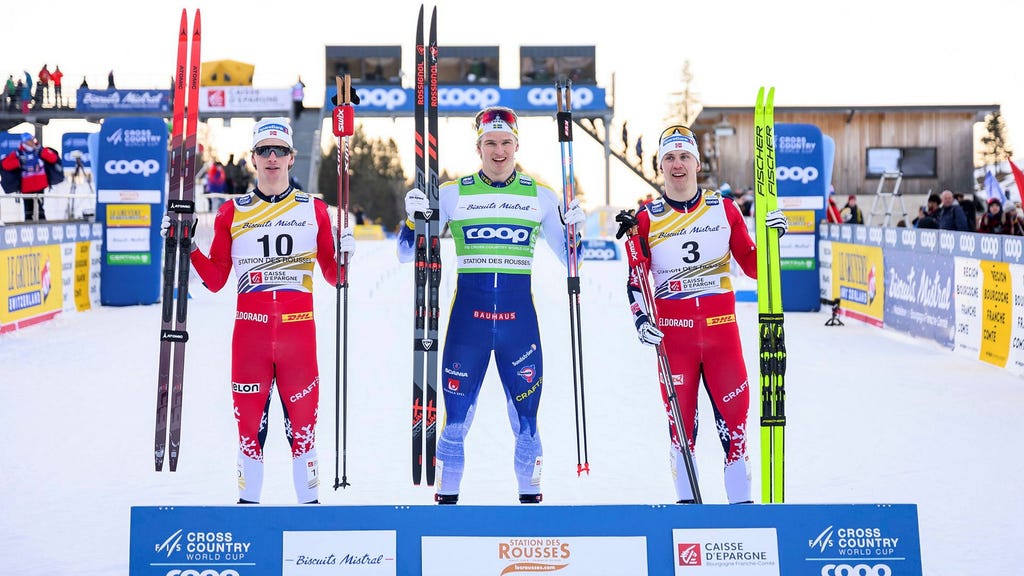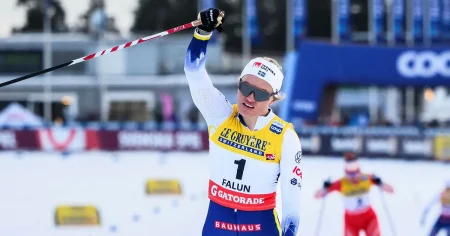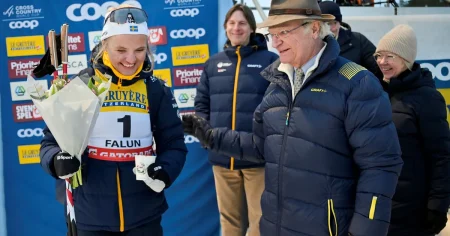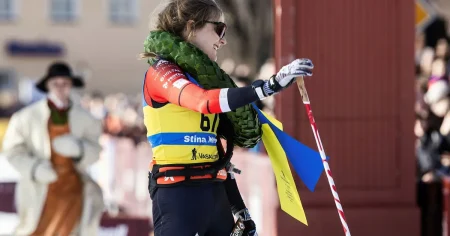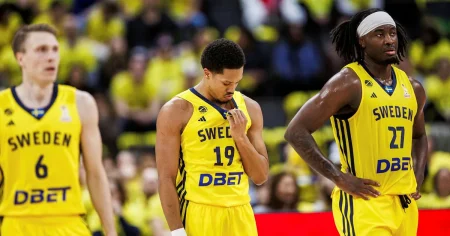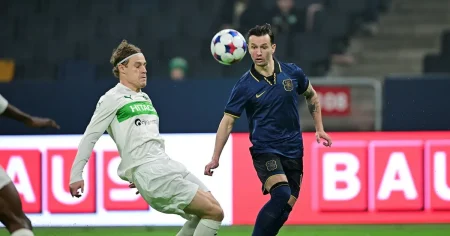Edvin Anger’s Triumphant Sprint Victory Fuels Sweden-Norway Rivalry
Edvin Anger’s resounding victory in the men’s sprint final at Les Rousses ignited the classic Sweden-Norway rivalry in cross-country skiing. Anger dominated the race from start to finish, holding off Norwegian challengers Ansgar Evensen and Erik Valnes. Notably absent was the top-ranked Norwegian skier, Johannes Høsflot Klæbo, whose absence fueled speculation about how he might have fared against the surging Swede. Anger’s performance was lauded by Valnes as a "demonstration of power," underscoring the young Swede’s rising prominence in the sport. This victory cemented Anger’s position as a contender for the upcoming World Championships, with Swedish team officials confirming his likely inclusion and medal potential. Anger’s dominance injected a much-needed spark into the Sweden-Norway dynamic, which he highlighted as a crucial element for excitement and discussion within the skiing world.
Kristine Stavås Skistad’s Comeback Win Adds Fuel to the Fire
The women’s final further intensified the Nordic rivalry, with Kristine Stavås Skistad of Norway edging out Swedish sprinters Maja Dahlqvist and Jonna Sundling. Skistad’s victory marked a significant return to form after a recent surgery and subsequent setback in her comeback race. She considered the win a strong indicator of her progress towards the World Championships. Dahlqvist attributed her second-place finish to a poor starting position, acknowledging the Norwegians’ speed off the line. Sundling, achieving her best classical sprint of the season, downplayed the rivalry aspect, focusing on her individual performance. Swedish team officials, however, anticipated that the Skistad-Sundling battle would be a key storyline at the World Championships, particularly in the freestyle sprint.
Swedish Team Dynamics and World Championship Implications
The performances in Les Rousses offer significant insights into the current state of Swedish skiing. While Anger’s victory signals a resurgence in men’s sprinting, the women’s results highlight both the team’s strength and areas needing improvement. Dahlqvist’s reflection on her start underscores a tactical element that could be crucial in future races. The comments by Swedish team officials further emphasize the importance of these results in the context of the upcoming World Championships. Anger’s expected participation and medal contention solidifies his role as a key figure in the men’s team. The anticipated Sundling-Skistad rivalry sets the stage for a thrilling showdown in the women’s freestyle sprint.
A Deeper Dive into the Rivalry and Individual Performances
The Swedish perspective on the rivalry is multifaceted. Anger relishes the heightened attention and competitive spirit that a strong Swedish team brings to the dynamic with Norway. Dahlqvist’s focus on her start demonstrates a pragmatic approach to improving her performance against the strong Norwegian competition. Sundling’s more reserved attitude perhaps reflects a focus on personal progress rather than direct rivalry. The comments from Johanna Hagström, who didn’t make the final, inject a more boisterous element into the narrative, expressing confidence in Sundling’s ability to outperform Skistad in the freestyle sprint at the World Championships. These diverse perspectives highlight the complex interplay of individual ambitions and national pride within the Swedish team.
Looking Ahead to the World Championships: Key Takeaways and Predictions
The Les Rousses sprint races served as a critical pre-World Championship test, revealing both individual form and team dynamics. Anger’s dominance positioned him as a serious medal contender, while the close competition among the women suggests a thrilling battle for the podium. The re-emergence of Skistad as a force to be reckoned with adds another layer of intrigue, particularly in the context of her developing rivalry with Sundling. The Swedish team, while showing promise, also identified areas for improvement, especially in race tactics and starting speed. The races highlighted the importance of strategic positioning, particularly in the fast-paced sprint format. These observations set the stage for an exciting World Championships, with the Sweden-Norway rivalry primed to be a central storyline.
The Broader Significance of the Les Rousses Results
Beyond individual performances and team rivalries, the Les Rousses sprint races offered a glimpse into the evolving landscape of cross-country skiing. The absence of Klæbo, while raising questions about his potential performance, also underscored the depth of talent in both the Norwegian and Swedish teams. The emergence of new contenders like Anger adds an element of unpredictability and excitement to the upcoming World Championships. The races also highlighted the continued importance of strategic execution and technical proficiency in sprint competitions. The interplay of these factors promises to make the World Championships a compelling showcase of athleticism and tactical prowess.



